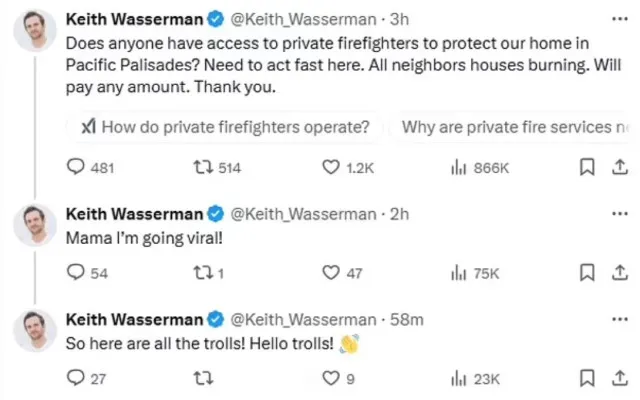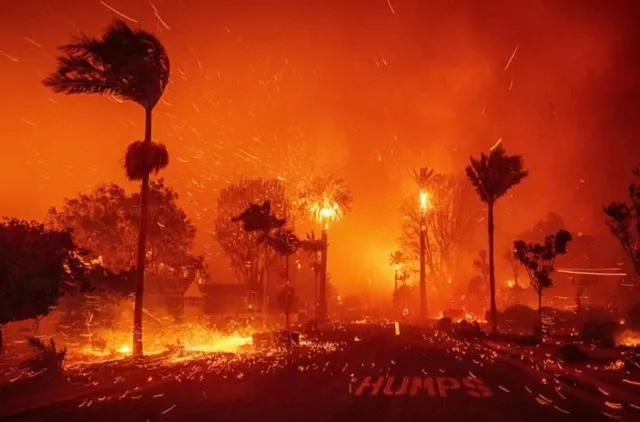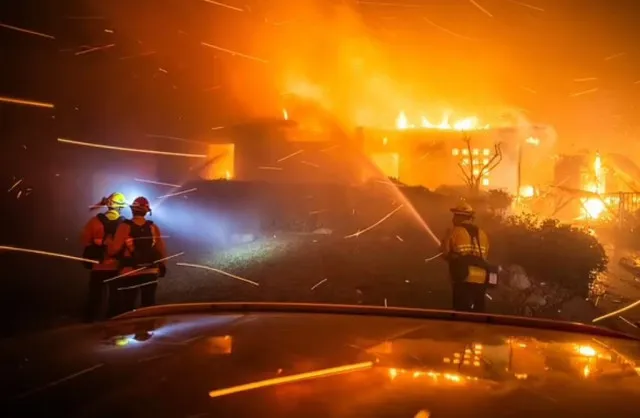The devastating Pacific Palisades wildfires in Los Angeles have consumed over 2,900 acres, leaving destruction in their wake. Among the chaos, a social media post by millionaire Keith Wasserman, co-founder of Gelt Venture Partners, ignited widespread criticism. His request for private firefighters to save his mansion during the crisis was seen as a glaring display of privilege, sparking debates on wealth, resource allocation, and community priorities in times of disaster.

CEO Keith Wasserman faced backlash for seeking private firefighters to protect his Pacific Palisades home. Image Credoits: Keith Wasserman/ X
The Controversial Plea That Went Viral
As flames engulfed Pacific Palisades, Wasserman turned to social media platform X (formerly Twitter) to issue a desperate plea. “Does anyone have access to private firefighters? Will pay any amount. All neighbors’ houses burning,” he wrote.
The post quickly went viral, amassing over 900,000 views and nearly 500 replies. However, instead of garnering support, the message attracted harsh criticism from users who saw it as “tone deaf” and emblematic of privilege.
One user commented, “Incredible nerve. He’s asking for resources while others are struggling to evacuate.” Another added, “This is a public display of rich privilege in a time of crisis.” The backlash highlighted the stark contrast between those prioritizing personal property and the broader community facing evacuation and loss.
Keith Wasserman Defends His Actions
Amid the storm of criticism, Wasserman defended his intentions. He clarified that his primary goal was to protect homes in the area, including his own, and mentioned that his family had already evacuated. Despite his explanation, many felt his actions reflected an imbalance of priorities during a time when collective efforts were needed to address the widespread devastation.
Some users, however, expressed sympathy for Wasserman, acknowledging the emotional toll of losing one’s home. “You’re alive—that’s what matters most right now,” one supporter wrote, emphasizing the importance of safety over material possessions.
The Pacific Palisades Wildfires: A Scene of Devastation
The Pacific Palisades wildfire has wreaked havoc on the Los Angeles community. Fueled by hurricane-force winds and exacerbated by poor visibility, the fire has destroyed multimillion-dollar homes and forced thousands of residents to flee. California Governor Gavin Newsom confirmed that “many structures” were lost, with nearly 30,000 residents placed under evacuation orders.

Critics called his plea “tone deaf,” highlighting the privilege of hiring help amid a community-wide crisis. Image Credits: Keith Wasserman/ X
Firefighters have been battling tirelessly to contain the blaze, but the challenging conditions have made their efforts increasingly difficult. Families have fled on foot, abandoning vehicles on blocked evacuation routes, while emergency crews used bulldozers to clear the way. In one instance, firefighters evacuated a 102-year-old woman from a Pasadena nursing facility as flames approached, underscoring the peril faced by vulnerable residents.
Private Firefighting Services: A Divisive Solution
Wasserman’s request for private firefighters has reignited debates about the ethics and effectiveness of using private resources during public emergencies. Private firefighting companies have previously been deployed in California to protect specific properties, such as vineyards, during wildfires. While these services offer tailored protection, their actions often raise concerns.
In 2021, private crews were accused of lighting unauthorized backfires, endangering surrounding areas and failing to coordinate with Cal Fire, the state’s fire authority. These incidents highlight the risks of privatized firefighting during large-scale emergencies, where unregulated efforts can jeopardize broader containment strategies.
Critics argue that private firefighting services exacerbate inequalities, giving wealthier individuals a safety net unavailable to most residents. This divide becomes even more evident during disasters, as public resources are stretched thin while private crews protect the interests of a select few.

The wildfire has devastated 2,900 acres, forcing evacuations and threatening 13,000 structures in the area. Image Credits: AP
Navigating Chaos and Loss
For the residents of Pacific Palisades, the wildfires have brought chaos and heartbreak. Frightened families left behind belongings, cramming into evacuation shelters or fleeing to safety however they could. Abandoned vehicles, including luxury cars, were left crumpled or damaged as bulldozers cleared evacuation routes.
Despite the destruction, Los Angeles Fire Chief Kristin Crowley reported no immediate deaths or injuries. The absence of fatalities amid such devastation stands as a testament to the bravery and resilience of emergency responders and the community at large.
The Broader Ethical Questions of Disaster Response
The outcry over Wasserman’s plea is about more than just one individual’s actions. It underscores a larger conversation about resource allocation, wealth disparity, and responsibility during public emergencies. In crises like wildfires, should private resources be mobilized at the expense of collective needs? Or is it reasonable for individuals to leverage their wealth to protect what they hold dear?
The ethical dilemmas of private firefighting highlight the tension between individual and community priorities. While some argue that private solutions can ease the burden on public resources, others contend that they divert attention and exacerbate existing inequalities.

Private firefighters have faced scrutiny, with authorities intervening in past cases for safety violations. Image Credits: AP
The Path Forward: Collective Action and Preparedness
The Pacific Palisades wildfire serves as a grim reminder of the increasing frequency and intensity of natural disasters in California and beyond. Addressing these challenges requires not just emergency response but proactive measures to mitigate risks and ensure equitable access to resources.
Public agencies must strengthen coordination with private entities to prevent conflicting efforts during disasters. Equally important is fostering a sense of collective responsibility, where community needs take precedence over individual interests.
Conclusion: A Call for Unity Amid Crisis
Keith Wasserman’s viral post may have sparked outrage, but it also shed light on the broader challenges of disaster response in an unequal society. The devastation caused by the Pacific Palisades wildfire reminds us of the fragility of our homes and the importance of prioritizing human lives over material possessions.
As California continues to battle wildfires, the path forward must emphasize unity, preparedness, and equitable resource distribution. Only by working together can communities weather these storms and rebuild stronger, ensuring that no one is left behind in the face of disaster.